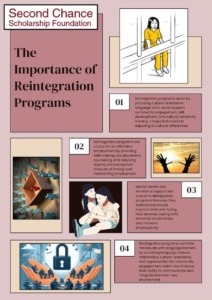Reintegration Struggles For Young Offenders
Stepping out of the justice system is just the beginning of a challenging journey for young offenders. Beyond the bars lie a multitude of obstacles that often go unnoticed.
The Harsh Reality of Reintegration
1. Stigma and Discrimination
Young offenders often face stigma and discrimination when they try to reintegrate into society. This makes it difficult for them to find housing, employment, and support. According to the National Centre for Biotechnology Information, being labelled as a stigmatised person has substantial effects on the way people think and feel about themselves. It also affects how they expect to be treated by others in their environment. Howard Becker, a renowned sociologist, came up with the Labelling Theory, which talks about how society’s terms to define deviants influence their self-identity and behaviour. Therefore, stigma and discrimination faced by ex-offenders create a big hurdle, not only through external factors like how they are treated or discriminated against, but also through internal factors like issues with how they identify themselves and what they think society expects from them.
2. Financial Instability
Many young offenders struggle with financial instability after release, as they may not have access to stable income or financial resources. This is due to multiple reasons, the most prominent one being their criminal record. Many employers do not prefer hiring individuals who have a criminal record due to trust and reliability issues. Other reasons like lack of recent and relevant experience also add to the difficulty of getting a stable job. This leads to these ex-offenders getting stuck in an endless cycle of unemployment making reintegration into society very hard for them.
Many ex-convicts also have debts which demotivates them from seeking stable and higher-paying jobs as a certain amount of their income automatically gets cut to pay off the loans leaving them with limited disposable income. Therefore, they look for unofficial employment opportunities which provide no job security.
3. Lack of Support Networks
When young offenders exit the justice system, they may lose their support networks, such as family and friends, leaving them feeling isolated and alone. Emotional support from loved ones can significantly affect an individual’s behaviour, whether positively or negatively. Studies show that incarceration decreases an individual’s probability of getting married by 50%, while also straining familial relationships and leading to a lack of emotional and moral support. This can make reintegrating into society even more challenging for the individual.
4. Mental Health Challenges
Young offenders often experience mental health challenges such as depression and anxiety. These challenges can worsen due to the stress of reintegrating into society. According to BMC Psychology, the prison environment can be harmful to mental health. This is because it results in the disconnection from family, society, and social support, loss of autonomy, diminished meaning and purpose of life, fear of victimization, increased boredom, unpredictability of surroundings, overcrowding and punitiveness, experiencing and witnessing violence, negative staff-prisoner interaction, and other adverse experiences. Therefore, it is essential to implement penalties that can help these individuals reintegrate into society once they have served their time.
5. Limited Education and Employment Opportunities
Without access to education and job training programs, young offenders may struggle to find meaningful employment opportunities. Those who have been in prison for a long period of time often lack updated technological advancements, social and communication skills, as well as sufficient education to seek stable jobs.
Imagine being a young offender trying to rebuild your life after making a mistake. How would you feel facing stigma, discrimination, and a lack of support? Every young offender deserves a second chance at life. By supporting the Second Chance Scholarship Foundation, you can offer hope and redemption to those who need it most.
Your support can make a real difference in the lives of young offenders. It can help them find stable housing, gain access to education and job training, and rebuild their lives.

Second Chance Foundation’s Commitment
1. Comprehensive Support Programs
Second Chance Foundation offers a range of support programs, including housing assistance, job training, mental health support, and education scholarships.
2. Community Engagement
The foundation actively engages with the community to raise awareness about the challenges faced by young offenders and promote empathy and understanding.
3. Success Stories
Through its programs, the Second Chance Foundation has helped countless young offenders successfully reintegrate into society, find stable employment, and lead fulfilling lives.
We have an opportunity to help young offenders by supporting the Second Chance Scholarship Foundation. Your donation can make a significant difference in their lives and provide them with the second chance they deserve. Join us in this noble cause and let us make a positive impact together. Click here to make your contribution.


15 Comments
Don’t you think trying to find a prerogative change to harsh financial conditions, which leads to alot of criminal acts is more important.
I completely agree with the fact that finding a prerogative change to harsh financial conditions can not only reduce crime rates but also reduce the rate of recidivism. Although, I feel the article makes a good point talking about how it is important reintegrate young ex-offenders back into the society so that they can become an asset instead of a liability. Prevention of crime itself is one thing but correctional measures that need to be taken for the crimes that have already been committed by the ex-offenders to help economies grow as a whole.
Greatly written
Such an informative and well thought out article!
Great stuff
Great stuff kashish
Well written! Love how stages of integration program are defined in this article. Great going.
Insightful!
So well written!!
Government needs to look into this
Very relevant endeavor, much needed, facts put together so explicitly by Kashish, well done.
Author seems smart
Finally, Its good to see authors not using chatgpt
Great Graphic designing
I agree with the author.We should be more considerate while dealing with young offenders.
Add Comment